Harding University
Harding University is a private liberal arts university with its main campus in Searcy, Arkansas. It is the largest private university in Arkansas. Established in 1924, the institution offers undergraduate, graduate, and pre-professional programs. The university also comprises Harding School of Theology, located in Memphis, Tennessee, which was formerly known as Harding Graduate School of Religion.[3] Harding is one of several institutions of higher learning associated with the Churches of Christ.
 | |
| Motto | Community of Mission |
|---|---|
| Type | Private university |
| Established | 1924 |
Religious affiliation | Churches of Christ |
Academic affiliations | Space-grant |
| Endowment | $169 million (2020)[1] |
| President | David Burks[2] |
| Provost | Marty Spears |
Academic staff | 314 |
| Students | 4,879 |
| Location | , , United States 35°14′52″N 91°43′38″W |
| Campus | Suburban, 350 acres (140 ha) |
| Colors | Black and Gold |
| Nickname | Bisons |
Sporting affiliations | NCAA Division II – GAC |
| Website | www |
Through the sponsorship of Harding, Margaret Thatcher, the former Prime Minister of the United Kingdom, was elected honorary member to the American national honor society Omicron Delta Kappa in 1995, when she delivered a lecture at the American Studies Institute.[4][5] In 1997, Harding also sponsored the membership of Texas governor and future president George W. Bush.[5]
History
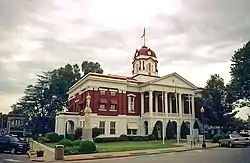
Foundation
Harding College was founded in Morrilton, Arkansas, in April 1924 after the merging of two separate colleges: Arkansas Christian College of Morrilton, Arkansas, and Harper College of Harper, Kansas.[6] It was named after James A. Harding, a minister and educator associated with Churches of Christ.[7]
After Galloway Female College merged with Hendrix College in 1933, Harding College purchased Galloway's Searcy, Arkansas campus for a fraction of its estimated value and moved there in 1934.[8]

Cold War
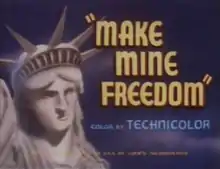
Harding University first advocated for pacifism and political disengagement, in line with its own founding influences like James A. Harding and David Lipscomb as well as with wider trends in many other evangelical Christian movements during late 19th- and early 20th-century America. This trajectory shifted during the Cold War, however. Harding became involved in the production of a series of animated cartoons extolling the virtues of free-market capitalism. This series, including "Make Mine Freedom" (1948) as well as "Meet King Joe" (1949), were all produced by John Southerland Productions as part of a concerted campaign to fight against the threats of communism at the beginning of the Cold War using popular media. Funding came from Alfred P. Sloan, the major figure at General Motors Corporation. The animations contrast mainstream American values with the values of Soviet communism.[9] The initiative represented a central concern of Harding president George S. Benson, who believed that fighting socialism was a moral imperative.
Segregation
During segregation in the United States, the school remained racially segregated under the leadership of president George S. Benson, a staunch segregationist.[10] In spite of the overwhelming disagreement of the school's students and faculty, Benson maintained that blacks were under "the curse of Ham" and that mixing of the races was against the divine order. In 1953, Norman Adamson became the first black person accepted to Harding. However, when administrators learned he was black he was denied admission.[11]

In 1963, when the Civil Rights Act would threaten a cutoff of federal funding, Benson acquiesced and a few black students were admitted that year.[12] By 1969 it had only 20 black students out of a student body of over 2,000. While President Clifton L. Ganus, Jr, stated that he did not "see any Biblical injunction against it", he discouraged interracial relationships. Under his leadership, the Harding administration allowed students to enter into interracial relationships, but made it policy to caution them against it and informed their parents in writing. The policy of allowing such relationships was the focus of much anger from the families of some white students. In 1969, three black students who protested racism at the university were expelled.[13][14] In 1969, Ganus attempted to placate students by promising to hire 'Negro' teachers, but this never transpired.[15][16]
Since the Civil Rights Era
In 1980, Richard King became the first African-American Faculty Member.[16]
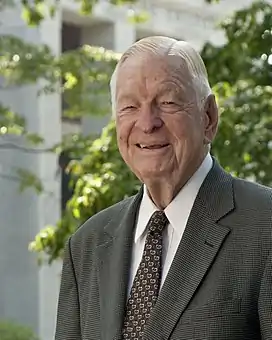
In 2020, a former graduate organized a petition drive to rename the Benson auditorium because of Benson's racist views. The petition also asked that the auditorium carry the name of Botham Jean instead, a recent Black alumnus who had been shot and killed in his own apartment by a white Dallas police officer who alleged she had confused their apartments and mistaken the 26-year-old for a burglar. Upon review, and against the wishes of the Black Student Association, the university, under the leadership ion Bruce McLarty, defended Benson and chose to retain the name.[17] However, President McClarty recognized the University had no buildings or landmarks on campus that recognized Black Alumni and promised some sort of memorial to Botham Jean within a year.[17][18] Facing this controversy and a 23% decline in enrollment over 5 years, the board dismissed McClarty, with former President David Burks resuming control.[19][20])
Currently, minority students constitute ca. 15 percent of the student body, according to the university.
Campus
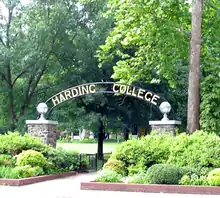
Searcy
The Searcy campus comprises 48 buildings located on 350 acres (140 ha) near the center of Searcy.[21] The campus lies roughly between Race Avenue and Beebe-Capps Expressway and includes several other minor thoroughfares, the campus of Harding Academy, Harding Place (a retirement community), and portions of surrounding neighborhoods.
The heart of the campus includes the George S. Benson Auditorium, which sits facing the McInteer Bible and World Missions Center. Brackett Library, the American Studies Building (Education and English departments), the David B. Burks American Heritage Building (hotel and offices), Pattie Cobb Hall, and the Administration Building frame a grassy central commons area upon which can be found several paths, a fountain, and a bell tower made out of bricks from the institution that once stood there: Galloway Female College.
Notable additions in recent years have included several dormitories; expansions of the cafeteria, student center, art department; and the David B. Burks American Heritage Building, as well as the addition of the McInteer Bible and World Missions Center, which came with the closing of the road that once ran through that part of campus. It is now a pedestrian mall.
After competing in the Ganus Athletic Center from 1976 until 2006, Harding's volleyball and basketball teams moved back to the Rhodes-Reaves Field House. The field house is a round-topped airplane hangar built for France in WWII, and purchased as war surplus by George S. Benson. It was reconstructed on campus in 1947. In 2007 it was retrofitted to accentuate the already deafening acoustics of the facility, working to the advantage of the home teams and earning Harding the title of "Best Road Trip Destination in College Basketball."[22] The campus also has extensive intramural sports facilities.
In 2013, Harding renovated part of Unity Health South into an area for Harding's Doctor of Physical Therapy Program.
In 2017, Harding remodeled space in the McInteer Center which houses the Linda Byrd Smith Museum of Biblical Archaeology.[23] According to Harding University, "This museum features artifacts related to the period of the patriarchs, crucifixion and chronologies related to the ancient world." It includes an LCD touch-screen panel with three or four educational videos. Objects in exhibit will be rotated annually.
Noteworthy buildings
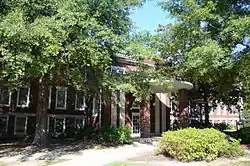
The Dean L.C. Sears House, named for the first dean of Harding University, was a historic house registered in the National Register of Historic Places. Also on the registry is Pattie Cobb Hall.
The Reynolds Center was created through and named for philanthropist Donald W. Reynolds.
Satellite campuses and campuses abroad
The university maintains satellite campuses in Arkansas, one in North Little Rock and a second in Rogers.[24]
Harding maintains permanent campuses in Florence and Athens. Study abroad semester programs are also provided in Brisbane, London, Paris, Arequipe (Chile), and Kalomo (Zambia).[25]
Academics
Organization
Structurally, the university comprises nine separate colleges: the College of Allied Health, the College of Arts & Humanities, the College of Bible & Ministry, the Paul R. Carter College of Business Administration, the Cannon-Clary College of Education, the Carr College of Nursing, the College of Pharmacy, the College of Sciences, and the Honors College. Each college then has its own subdivisions of departments or other sections.[26] The university also has a School of Theology in Memphis. Between these nine colleges, the university provides ninety-seven majors, ten undergraduate degrees, fourteen pre-professional programs, and twenty-one graduate and professional degrees.[27]
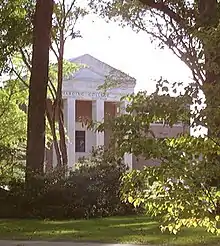
American Studies Institute
Harding houses the American Studies Institute (ASI), a center designed to supplement students' academic training and promote "a complete understanding of the institutions, values, and ideas of liberty and democracy."[28] In doing so, the ASI exhibits a generally conservative political stance, focused on going "back to the fundamental values that made this country great." The formal roots of this program date back to 1953, when Harding formed the School of American Studies.[29] Currently, the ASI sponsors a number of programs aimed at promoting these values. These include entrepreneurial and leadership programs, a distinguished student honors program, the Belden Center for Private Enterprise Education, and participation in the Walton Scholars Program, which brings in qualified students from Hispanic countries to Arkansas colleges and universities.
Library
Harding University's primary campus houses the Brackett Library, which includes the Ann Cowan Dixon Archives & Special Collections. The library holds more than 340,000 print volumes and nearly 300,000 electronic resources.[30] It also houses the English Department Writing Center and the Media Center. Its School of Theology, in Memphis, maintains a well-respected theological library, the L. M. Graves Memorial Library.
Distinctions and rankings
Harding supports a chapter of Kappa Omicron Nu, a national honor society for colleges and universities with a strong humanities program. The University was distinguished through the National Historic Chemical Landmarks program of the American Chemical Society for its contribution to the history of chemistry, which came for its William-Miles History of Chemistry Collection, established in 1992.
Harding University was listed among the Top Ten Schools nationwide by the Wall Street Journal and Times Higher Education under two different categories in 2017: student engagement and student inspiration.[31] It has been ranked as the second best university in the state of Arkansas, after University of Arkansas, by the USA University College Directory.[32] Harding consistently ranks in the Top 25 for Best Regional Universities in the South according to the U.S. News & World Report.[33] In 2020, it ranked #249 among national universities overall.[34] It was also rated at B+ by the American rankings and review company Niche.[35]
Harding is accredited by the Higher Learning Commission. Specific colleges and programs have received further accreditation by specialized agencies as well.[36]
Student life
Athletics
Harding has competed in the NCAA at the Division II level since 1997, beginning in the Lone Star Conference moving in 2000 to the Gulf South Conference and then moving to the newly formed Great American Conference (GAC) in 2011. Men's sports include Soccer, Baseball, Basketball, Cross Country, Football, Golf, Tennis, and Track and Field. Women's sports include Basketball, Cheerleading, Cross Country, Golf, Soccer, Softball, Tennis, Track and Field, and Volleyball.
The facilities for the sporting events are: First Security Stadium, Ganus Activities Complex,[37] Stevens Soccer Complex,[38] Jerry Moore Field (baseball),[39] Berry Family Grandstand (softball),[40] Harding Tennis Complex,[41] and the Rhodes-Reaves Field House.[42] On October 19, 2019, the new indoor football facility was dedicated in honor of longtime football head coach Ronnie Huckeba. The Huckeba Field House is the largest indoor practice facility in NCAA Division II and one of the largest in the country for any level.[43]
Music
Harding has long cultivated a strong tradition of vocal performance. One student group featured as the spokespeople of Pepsi. Another provided vocals for Dolly Parton's album For God and Country.
Spring Sing
Spring Sing is an annual musical production held during Easter Weekend, featuring performances by the social clubs. It is widely attended by current and prospective students, alumni, and Searcy residents. An estimated 12,000 people attended the show each year.[44] Each year, an overall theme is selected, and each club develops music and choreographed routines for the show. Rehearsals begin as early as January. Spring Sing also typically features two hosts, two hostesses, and a general song and choreography ensemble, with these roles chosen by audition. The ensemble performs to music played by the University Jazz Band. Each club act is judged and, according to their performance, awarded a certain sum of money. The clubs then donate this money to charities of their choice.
Student-run media
The Department of Communications runs the state radio station KVHU.
Alongside publications of the University itself, such as the alumni newsletter Harding Magazine and the yearbook The Petit Jean, students produce their own periodical during the academic year, and it's called The Bison. This student-run publication is printed in nine issues per semester and made available through its multimedia website The Link.
In 2011 and 2018, LGBT students at Harding produced an unauthorised magazine called HUQueer Press, whose website was blocked by the University.[45] This decision by the administration – which aligned with those of similar universities – it gained more attention from national newspapers like The New York Times and online platforms like Jezebel.[46][47]
Social clubs
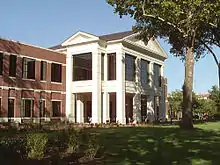
The university sponsors student-led "social clubs" that serve a similar social networking function to the Greek system, as Harding prohibits formation of local chapters of national social fraternities and sororities. (Two exceptions are Delta Phi, a chapter of Pi Sigma Epsilon, and Alpha Episolon, a chapter of Delta Mu Delta). Currently there are 15 women's social clubs and 15 men's social clubs at Harding.
Most of these organizations have adopted Greek letter names that are similar to national fraternity and sorority names. Social clubs are open to all academically eligible students and serve as some of the university's most visible student-led organizations. The clubs are a prominent part of student life with slightly more than half of all undergraduate students participating as social club members.
The social club induction process begins when clubs host "receptions" in the fall to recruit new members. The membership process culminates in Club Week, when each prospective member bonds with the other members of the club through a series of scheduled activities throughout the week. Once a student is accepted into the club, they attend biweekly meetings and can participate in club-sponsored sports, service projects, and Spring Sing.
List of clubs
- Alpha Tau Epsilon (men)
- Beta Omega Chi (men)
- Chi Sigma Alpha (men)
- Chi Kappa Rho (women)
- Chi Omega Pi (women)
- Delta Chi Delta (men)
- Delta Gamma Rho (women)
- Delta Nu (women)
- Gamma Sigma Phi (men)
- GATA (women)
- Iota Chi (women)
- Ju Go Ju (women)
- King's Men (men)
- Knights (men)
- Ko Jo Kai (women)
- Kyodai (men)
- Lambda Chi Theta (men)
- Omega Phi (men)
- Phi Kappa Delta (women)
- Pi Theta Phi (women)
- Regina (women)
- ROME (men)
- Shantih (women)
- Sigma Nu Epsilon (men)
- Sigma Phi Mu (women)
- Sub T-16 (men)
- Titans (men)
- Theta (men)
- TNT (men)
- Zeta Pi Zeta (women)
- Zeta Rho (women)
Hazing controversy
Harding's social clubs have been involved in hazing controversies over the years. As a result, some have been forced to disband, including the Seminoles (2010), Kappa Sigma Kappa (2005),[48] Mohicans (1982),[49][50] and most recently Pi Kappa Epsilon (2015).[51]
Charity initiatives
Harding students are known for offering a regular stream of voluntary services at the Chimala Mission Hospital, in Tanzania.
Religious conduct and policies
In keeping with the university's expectation of the "highest standards of morality, integrity, orderliness, and personal honor," Harding has a number of rules that were designed to foster these standards on campus.[52]
Each weekday morning, students are required to attend chapel service. Chapel presentations are usually led by students or faculty, but special events and guest speakers take place on a regular basis. Classes on biblical studies are also mandatory for students taking at least 8 hours for credit in a given semester. Additionally, students must complete at least 8 hours of Bible courses in order to complete the Liberal Arts curriculum.
Most students are required to live on campus, and those who do are required to be in their residence halls by midnight (00:00) during the week and 1 a.m. (01:00) on weekends; except in certain open house events, men and women are not allowed to visit one another's dorm rooms. In addition, Harding prohibits premarital, extramarital, and homosexual sex.[53]
The consumption of alcohol is also prohibited for students and faculty both on and off campus. A violation of this policy usually results in expulsion for one semester.[54] (Searcy, Arkansas, lies in White County, which is also a dry county.) Harding has had a no smoking policy on campus since August 1978. More broadly, disciplinary action may be taken against students who use illegal drugs whether on or off campus.
Harding requires faculty to dress professionally when attending class, chapel, lyceum, and American Studies programs. Prior to August 1979, female students were required to wear dresses to class and are still required to dress "modestly." In recent years, there has been a controversy regarding the wearing of yoga pants on campus.
People
Academia
- Leonard Allen, historian and college administrator
- James Bales, professor and administrator
- Martin Doyle, ecologist at the Nicholas Institute for Environmental Policy Solutions of Duke University
- E. H. Ijams, president of Lipscomb University
- Ed Madden, poet, gay rights activist, professor of English, and Director of Women's and Gender Studies at the University of South Carolina[55]
- Annie May Alston Lewis, theological librarian
- J. Stanley Marshall, college administrator, was president Florida State University
- Edward Granville Sewell, American mathematician and professor at University of Texas, El Paso[56]
- Rubel Shelly, writer, minister, professor, and former president of Rochester College[57]
- Richard Felix Staar, political scientist, historian, and fellow at Stanford
Athletics
- Janet Cherobon-Bawcom, Olympian distance runner
- Tank Daniels, former NFL American football linebacker
- Scarborough Green, MLB outfielder
- Chad Marshall, an American Major League soccer player
- Bryce Mitchell, mixed martial arts fighter
- Jon Murray, university cross country coach
- Jim Nichols, football coach
- Ty Powell, professional football player
- Matt Riviera, professional wrestler
- Preacher Roe, Major League Baseball pitcher
- Arthur Hubert "Hubie" Smith, basketball coach
- Stephany Smith, women's basketball coach
- R-Truth, wrestler and actor
Business
- LaMar Baker, businessman and politician
- Michael Blue, billionaire entrepreneur and co-founder of Privateer Holdings
Music, art, and entertainment
- Tamera Alexander, author
- Roxanne Beck, actress and screenwriter
- Stephen Mark Brown, American opera tenor
- David Ray Campbell, writer and producer
- Verna Howard, founder of the radio International Gospel Hour, originally based in Texarkana, Texas[58]
- Jerry W. Mitchell, investigative reporter and recipient of a "genius grant" from the MacArthur Foundation
- Willie Robertson, star of A&E's Duck Dynasty as well as CEO of Duck Commander[59]
- Korie Robertson, star of A&E's Duck Dynasty and wife of Willie Robertson
- W. Stephen Smith, voice teacher and author, Northwestern University Professor of Voice and Opera[60]
- Ray Walker, singer with The Jordanaires
Politics
- Tim Barnes, Democratic politician from Tennessee
- Mary Elizabeth Bentley, Republican member of the Arkansas House of Representatives[61]
- Jim R. Caldwell, first Republican member of the Arkansas State Senate in the 20th century
- Jonathan Dismang, politician
- Timothy Chad Hutchinson, attorney and former member of the Arkansas House of Representatives
- Jeremy Kernodle, United States District Judge
- David Porter, Texas Railroad Commissioner
- Kenneth Starr, attorney, judge, U.S. Solicitor General, Special Prosecutor for the Impeachment of Bill Clinton
- Thomas Philip Watson, politician
Religion
- Charles Coil, evangelist
- Roger Duke, theologian
- Gary Holloway, executive director of the World Convention of Churches of Christ
- Larry M. James, theologian
Other
- George Andrew Davis, Jr., fighter pilot and flying ace of the United States Army Air Forces in World War II and the Korean War
- Khalil Jahshan, Palestinian-American activist, media commentator, and executive director of the Arab Center Washington DC
- Larry M. James, social worker and CEO of the Dallas housing enterprise CitySquare
- Botham Jean, murder victim
- Farrell Till, activist and editor of The Skeptical Review
Notable faculty, current and former
- Carl Allison, football and baseball coach
- Stanley Jennings Carpenter, Medical Entomologist, U.S. Army Colonel
- James W. Carr, professor of business and member of the National Security Education Board
- James Burton Coffman, preacher, author
- James Dickey, basketball coach. Played and coached at Harding.
- Ronnie Huckeba, football coach
- Paul Fiser, football coach
- Jack P. Lewis, theologian
- John Robert McRay, biblical scholar
- Michael A. O'Donnell, psychologist
- Thomas H. Olbricht, biblical scholar
- Carroll D. Osburn, theologian and noted biblical scholar
- John Prock, football coach
- Cheri Yecke, educator and civil servant in the Bush administration
Recipients of honorary degrees
- Marshall Keeble, African-American minister
- Levy Mwanawasa, president of Zambia
- Cline Paden, missionary
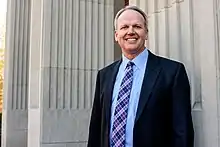
Presidents
- J.N. Armstrong (1924–1936)
- George S. Benson (1936–1965)
- Clifton L. Ganus Jr. (1965–1987)
- David Burks (1987–2013)
- Bruce McLarty (2013–2020)
- David B. Burks (interim)
References
- "Report: Harding University announces new legacy society for estate gifts". The Batesville Daily Guard. October 20, 2020. Retrieved October 21, 2020.
- Burke, Lilah (November 3, 2020). "Harding University Replaces President". Inside Higher Ed. Retrieved 14 November 2020.
- "Harding - Colleges & Departments". www.harding.edu. Retrieved 2018-12-04.
- "Announcement of Lady Thatcher". The Bison. March 31, 1995.
- "Notable Members". ODK.
- "Harding University - Encyclopedia of Arkansas". www.encyclopediaofarkansas.net. Retrieved 2018-12-05.
- "Harding - About Harding - History".
- "Galloway Women's College". Retrieved 17 November 2020.
- Animation, in; History; June 25th, Politics |; Comments, 2014 3. "Animated Films Made During the Cold War Explain Why America is Exceptionally Exceptional". Open Culture. Retrieved 2018-12-06.CS1 maint: numeric names: authors list (link)
- "Despite School Sentiment, Harding's Leader Said No to Integration". Arkansas Times.
- Key, Barclay (2020). Race and Restoration: churches of Christ and the African American Freedom Struggle. LSU Press. p. 71. ISBN 9780807172742.
- Brown, Michael D (6 June 2012). "Despite school sentiment, Harding's leader said no to integration". Arkansas Times. Retrieved 29 December 2018.
- "Harding College Admits Three Freshman Negro Studetns". Nashville Southern School News. October 1, 1963. Retrieved 1 August 2020.
- Key, Barclay. "Race and Restoration: churches of Christ and the African American Freedom Struggle" (PDF). pp. 53, 70, 71, 364, 348. Retrieved 29 December 2018.
- "Student stir at Searcy". Springfield Leader and Press. March 21, 1969. Retrieved 21 June 2020.
- Petit Jean 1983.
- Ross Jr., Bobby (July 14, 2020). "Despite petition, Harding to keep George S. Benson's name on its chapel venue". Christian Chronicle. Archived from the original on July 16, 2020. Retrieved 21 July 2020.
- "On the matter of the Benson Auditorium". Archived from the original on July 3, 2020. Retrieved 21 July 2020.
- Adame, Jaime (November 6, 2020). "McLarty leaving job as president of Harding". Arkansas Democrat Gazette. Retrieved 17 November 2020.
- Editor-in-Chief, Bobby Ross Jr (2020-10-30). "Under pressure, Bruce McLarty retiring as president of Harding University". The Christian Chronicle. Retrieved 2020-10-31.CS1 maint: extra text: authors list (link)
- "Harding - About Harding - Quick Facts". www.harding.edu. Retrieved 2018-12-05.
- "Rhodes Field House at Harding University - One of a Kind". 2013-02-23. Retrieved 31 December 2018.
- "New McInteer Museum". Harding University. Harding University. Retrieved 04-08-17. Check date values in:
|access-date=(help) - "Campuses". Retrieved 4 November 2019.
- "Harding University". Retrieved 4 November 2019.
- "College & Department Overview". Harding University. Retrieved July 24, 2015.
- "Harding - Colleges & Departments". www.harding.edu. Retrieved 2018-12-05.
- "Archived copy". Archived from the original on 2006-09-06. Retrieved 2007-02-15.CS1 maint: archived copy as title (link)
- "Harding University - Encyclopedia of Arkansas". www.encyclopediaofarkansas.net. Retrieved 2018-12-05.
- "Brackett Library Statistics". Brackett Library. Harding University. Retrieved 2 November 2019.
- "2017 Press Release, Harding University on WSJ Top 10 Lists".
- "Harding University". USA University College Directory. 2021.
- "Harding University Rankings Overview". 2018.
- https://www.usnews.com/best-colleges/harding-university-10311
- "Niche, Harding Webpage".
- "Accreditation Overview". Harding University. Retrieved July 25, 2015.
- "HardingSports". HardingSports.com. Harding University. Retrieved 17 February 2017.
- "www.HardingSports.com". HardingSports. Harding University. Retrieved 17 February 2017.
- "HardingSports.com". HardingSports. Harding University. Retrieved 17 February 2017.
- "HardingSports". HardingSports.com. Harding University. Retrieved 17 February 2017.
- "HardingSports". HardingSports.com. Harding University. Retrieved 17 February 2017.
- "HardingSports.com". Harding Sports. Harding University. Retrieved 17 February 2017.
- "Harding News & Media". Harding News & Media. Harding University. Retrieved 2 November 2019.
- "Harding prepares for annual Spring Sing". arkansasonline.com.
- "Statement by Harding President Dr Burks".
- "Gay Rights at Christian Colleges Face Suppression".
- "Arkansas University Blocks Queer Zine".
- "KSK at Harding hazers "disbanded"". GreekChat.com. Retrieved 2014-07-28.
- Stutzman, Lexi (31 August 2012). "Club week 2012: Impact of the Arkansas Hazing Law on Harding's club week history, activities". thelink.harding.edu. Harding University. Archived from the original on 24 August 2015. Retrieved 2014-07-28.
- "Archived copy". Archived from the original on 2013-11-04. Retrieved 2013-11-04.CS1 maint: archived copy as title (link)
- "PKE chooses self-disbandment | The Bison". The Bison. 2015-10-01. Retrieved 2018-06-19.
- Student Handbook Archived 2006-09-02 at the Wayback Machine
- "Statement by Harding President McClarty on LGBT policies".
- "STUDENT HANDBOOK2020-21" (PDF). p. 17. Retrieved 31 October 2020.
- "Ed Madden - Arts & Sciences - University of South Carolina". sc.edu.
- ".: Professors : Mathematical Sciences : UTEP :". www.utep.edu. Retrieved 2018-12-04.
- "Rochester College Selects Dr. John Tyson As Next President - Rochester College". rc.edu.
- "Verna Elisha Howard (1911-2000)". therestorationmovement.com. Archived from the original on December 25, 2013. Retrieved July 12, 2013.
- "Duck Dynasty". harding.edu. Archived from the original on 2015-04-10.
- "W. Stephen Smith". Northwestern Bienen School of Music. Retrieved 2018-12-04.
- "Mary Bentley's Biography". Project Vote Smart. Retrieved April 12, 2015.